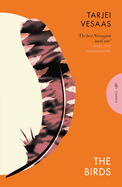
With The Birds, iconic 20th-century Norwegian author Tarjei Vesaas has, as Karl Ove Knausgaard opines, "written the best Norwegian novel ever." Translated by Torbjørn Støverud and Michael Barnes, The Birds proves to be a haunting and gutting novel in English as well.
The Birds tells the story of Mattis, a middle-aged man who is dependent, financially and otherwise, on his sister, Hege, because of an intellectual disability that undermines his ability to work and connect with other people. The siblings have been living together in the countryside for decades by the time the novel takes place, and the responsibility of caring for her brother is clearly taking a toll on Hege, who feels their isolation ever more keenly. Despite her attempts to remain kind, she is increasingly frustrated with Mattis.
Mattis has a deep connection with nature and perceives that the presence of a woodcock by their house is a harbinger of change. "He was standing by a dried-up patch of bog right underneath the woodcock's path, standing looking spellbound, reading a message or whatever it was that had been left there for him." Change does come when Mattis decides to become a ferryman and inadvertently brings another person into his and Hega's lives, altering their dynamic and the rhythm of their days. Ultimately Mattis is spurred by his altered status in the one place that had welcomed him to take dramatic action that calls into question his very survival.
Vesaas's beautiful, spare, and evocative prose elegantly braids together existentialist themes with modernistic depth and symbolism, exploring the alienation of a vulnerable protagonist trying to find a place in the world. --Elizabeth DeNoma, executive editor, DeNoma Literary Services, Seattle, Wash.

